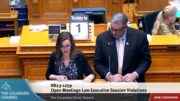By Jeffrey A. Roberts
CFOIC Executive Director
A Colorado Springs school board improperly denied a parent’s Colorado Open Records Act request for the names and application materials of all finalists considered for the superintendent’s job, a judge ruled this week in a case similar to the Boulder Daily Camera’s successful lawsuit against the University of Colorado regents.
Melanie Knapp is entitled to the records from Academy District 20 under the “plain and ordinary meaning” of the term “finalist” in CORA and the Colorado Open Meetings Law, El Paso County District Court Judge Thomas Kane ordered Thursday.

The open meetings law, aka the Sunshine Law, requires public bodies to reveal “the list of all finalists” under consideration for a chief executive officer position at least 14 days before an appointment is made. CORA requires the disclosure of finalists’ applications, defining “finalist” to mean an applicant for a chief executive officer position “who is a member of the final group of applicants or candidates” made public under the Sunshine Law.
If only three or fewer applicants possess the minimum qualifications for the position, they should be considered finalists, according to CORA.
The school board’s argument, that the law permits the disclosure of just one finalist for the superintendent position, “does not make logical sense,” Kane wrote in his decision. “If the statute requires that three finalists be named when only three individuals meet the minimum qualifications, it is not consistent to read the statute so as to permit the disclosure of only one finalist when more than three individuals meet the minimum qualifications.”
Kane’s decision is similar to the Mar. 6 ruling by Denver District Court Judge A. Bruce Jones that the CU regents violated CORA by refusing to provide the Daily Camera with the names and applications of all six candidates interviewed for the CU president’s job that went to Mark Kennedy last year. Jones wrote: “Under the plain and ordinary meaning of the statutes, there were more than one finalist for the 2019 CU President position. The Court reaches this conclusion by reading the statutory text consistently, harmoniously, and sensibly.”
The regents are appealing Jones’ ruling, but have released the names and application materials of five of six finalists for the presidency.
Knapp sued the Academy 20 school board in November, alleging the district wrongfully denied her CORA requests for the names and applications of candidates seriously considered for the superintendent’s job during two selection processes in 2019. That spring, the board named Kimberly Hough as the sole finalist. After she withdrew from consideration, it named another sole finalist, Thomas Gregory, who accepted the position.
Twenty-six people applied for the superintendent’s position, according to Kane’s ruling. During each hiring process, he noted, the board interviewed five applicants who were described by board president Tracey Johnson as “very fine and capable candidates.”
“From the information produced by the Board, the final round of interviews was the last point at which there was meaningful competition among the candidates, and as a consequence, there were 5 finalists for the Superintendent position,” the judge wrote.
Kane awarded Knapp reasonable attorney fees and costs, and he ordered the school board to disclose the names and applications of all superintendent finalists. But he stayed the order for 28 days to give the school board the opportunity to appeal the ruling.
“I’m very pleased with this important step,” Knapp wrote in an email to the Colorado Freedom of Information Coalition. “There is still another issue that is as important; that’s transparency in public meetings.”
Still pending are other claims in her lawsuit that the Academy 20 school board violated the open meetings law by making hiring decisions behind closed doors and failing to properly convene executive sessions. Knapp is represented by Boulder attorneys Eric Maxfield and Robert Gunning, who also represent the Daily Camera.
“I’m in the pursuit of Sunshine Law oversight for the long haul,” Knapp told CFOIC, which has reached out to Academy 20 for a comment on the decision.
Follow the Colorado Freedom of Information Coalition on Twitter @CoFOIC. Like CFOIC’s Facebook page. Do you appreciate the information and resources provided by CFOIC? Please consider making a tax-deductible donation.




